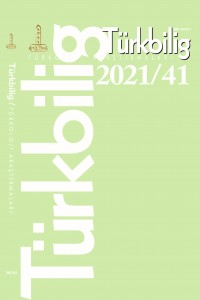Öz
Divan şiirinde dil haznesi kendinden önceki kuşaklar tarafından paylaşıldığı için şairin söylediği her söz geleceği değil, geleneği inşa eder; şiirde gösterişli bir dil, insanın üzerini örter. Temelleri 17. yüzyıla dayanan sosyal ve siyasal “yenileşme”nin edebȋ sonuçları 18. yüzyıldan itibaren görünür hȃle gelir ve başka türlü düşünmenin mümkün olduğunun keşfi ile 19. yüzyılın kapısı aralanır. Bu çalışmada Recaizade Mahmut Ekrem’in şiirlerinde ve nesirlerinde geleneğin, kendi ısrarını sürdürmeyip şairin tercihiyle şiire yerleştirilmesi ve benliğin idrak edilişi bağlamındaki yenilikler üzerinde durulacaktır. Eski ve yeninin birbirini yok etmediği, birbiriyle var olduğu bu edebȋ yaklaşım “içe dönüklük” ve “gündelik hayatın benimsenmesi” ekseninde tartışılacaktır.
Anahtar Kelimeler
Kaynakça
- Adorno, T. (2012). Ahlâk Felsefesinin Sorunları. (Çev. T. Birkan). İstanbul: Metis Yayınları.
- Eldem, E. (2005). İstanbul’da Ölüm: Osmanlı İslam Kültüründe Ölüm ve Ritüelleri. İstanbul: Osmanlı Bankası Arşiv ve Araştırma Merkezi Yayınları.
- Çotuksöken, B. (2013). Felsefe: Özne-Söylem. İstanbul: Notos Kitap.
- Girard, R. (2007). Romantik Yalan ve Romansal Hakikat Edebȋ Yapıda Ben ve Öteki. İstanbul: Metis Yayınları.
Öz
Since the treasure of language in Divan poetry is shared by the previous generations, every word the poet says build the tradition; not the future; a language which is bombast in poetry covers the person. The literary consequences of social and political "innovation" dating back to the 17th century become visible from the 18th century, and the 19th century is opened with the discovery that it is possible to think otherwise. In this study, in Recaizade Mahmut Ekrem's poems and prose, the emphasis will be on innovations about the perception of the “self” and the placement of tradition by the choice of the poet rather than continuing its own insistence. This literary approach, in which the old and the new do not destroy each other but exist with each other, will be discussed on the axis of "introversion" and "adoption of daily life".
Anahtar Kelimeler
Kaynakça
- Adorno, T. (2012). Ahlâk Felsefesinin Sorunları. (Çev. T. Birkan). İstanbul: Metis Yayınları.
- Eldem, E. (2005). İstanbul’da Ölüm: Osmanlı İslam Kültüründe Ölüm ve Ritüelleri. İstanbul: Osmanlı Bankası Arşiv ve Araştırma Merkezi Yayınları.
- Çotuksöken, B. (2013). Felsefe: Özne-Söylem. İstanbul: Notos Kitap.
- Girard, R. (2007). Romantik Yalan ve Romansal Hakikat Edebȋ Yapıda Ben ve Öteki. İstanbul: Metis Yayınları.
Ayrıntılar
| Birincil Dil | Türkçe |
|---|---|
| Konular | Dil Çalışmaları |
| Bölüm | Araştırma Makaleleri |
| Yazarlar | |
| Yayımlanma Tarihi | 29 Haziran 2021 |
| Gönderilme Tarihi | 17 Aralık 2020 |
| Yayımlandığı Sayı | Yıl 2021 Cilt: 2021 Sayı: 41 |



